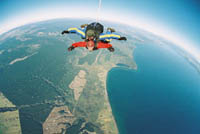Adrenaline addicts invent more kinds of extreme sports to grate on their own nerves
The modern word “extreme” comes from the Latin ‘extremus,’ meaning ‘far removed form the norm.’ Without a doubt diving from a plane or rushing along any given surface on a skate board is not a task for the weak hearted. So what is it that compels people to extreme sports and is it worth taking up the extremist lifestyle?

Extreme sports gets the adrenaline pumping, which is, apparently, the very thing all ardent lovers of extreme sports love to feel. Adrenaline is without a doubt an important chemical and neurotransmitter to the brain. It singles out the work of the body, reducing not only the quantity of sugar in the bloodstream but the different forms of stress our body undergoes.
For example, a person suffering an allergic reaction from a wasp sting in 97% of cases will be saved by one single jab of adrenaline. In such cases it can even restart the beating of the heart.
While scientists have proved that adrenaline does not burn or damage the muscles, it can still lead to nervousness, aggression and even depression. This leads us to think that the typical city lifestyle with it’s constant stress, dangers, and unavoidable fast pace is causing people to take up new extreme sports; be it under the sea, on mountain tops, or in the sky, people want to restore what is now being called – ‘the body’s natural balance.’
If this be the case should extreme sporters be looked at in a different light? As responsible, concerned people simply preserving their own health?
It has been noted that extreme sporters know how to arouse that once lost taste for life. For hangliders (alpinists and others) undertaking an extreme sport is a chance to make the most of life and to really see what a person is made of.
At the edge of a valley or at the top of a precipice it somehow seems strange dwelling on how to decorate the bathroom or petty squabbles with the boss – what we need is simply to survive, to feel strong and alive, to help the weak, or sacrifice your life for the sake of another. In these situations we really understand the true value of knowing yourself and those around you.
As for the dangers involved in extreme sports anyone can tell you that whatever you choose to do in life it will always carries some risk. For example sitting behind the wheel of a car - something most of us do everyday or our lives. But similar experiences will not give us that indefinable sensation of the beauty surrounding us, nor the invigorating sensation of realizing your own countless possibilities.
If you have the chance to talk to a snowboarder or a sky diver you will be astonished by the easy air in which they recount their experiences. While it’s true that when they recount their adventure there will be that glimmer of excitement in their eyes, yet no more than when a manager of a team group, when discussing the growth of sales in the office.
It turns out that extreme sporters actually worry about the feats they are undertaking and think up numerous ways of preventing against any possible mishaps. But can it really be that they are never overcome by the risks involved while they’re tumbling towards the earth at a frightening speed with only a parachute to protect them from the fall?
Having considered these paradoxes we could come to the conclusion that extremism is, in fact, quite relative. For the average manager to get up on a pair of rollerblades at the age of thirty and head straight on could be, for him, an extreme sport. Yet for an experienced professional this simple task would be nothing but a stroll in the park.
Maybe being extreme is the decision to take up something new, for it to become a passion, before you are gripped by the desire to master your chosen activity.
An extreme sport may just be a type of regular exercise or an exotic way of losing weight and keeping fit. Though granted - running round your house with the neighbours dog isn’t as exciting as skiing down an alpine mountain at 60mph.
It is not necessary to achieve an overwhelming feat in your chosen sport. Many types of extreme sports can be mastered with the help of an instructor from test jumping, parachuting or kayaking down the wild rapids of a river.
Sometimes simply in order to lose weight involves avoiding the easy attraction of a night in front of the TV with a microwave meal.
In several health resorts ‘presentations’ of the numerous types of extreme sports have already become a popular attraction. Having sampled a good selection of what’s on offer you can then choose the one that’s right for you. And it’s not worth casting a glance at the amazed faces of your friends and family, asking themselves which therapist long ago cured you of your weakness. It’s a lot better to take them along for the ride.
Medportal
Discuss this article on Pravda.Ru English Forum
Subscribe to Pravda.Ru Telegram channel, Facebook, RSS!


